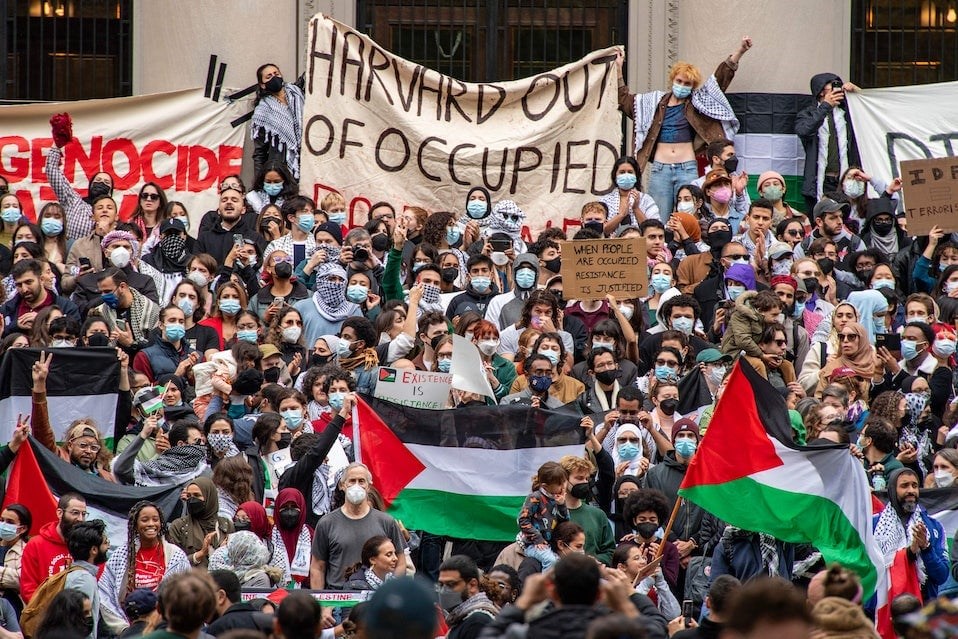US private universities are being cornered by pro-Israeli donors
Wealthy Americans threaten to withdraw their financial support from prestigious private Ivy League schools if pro-Palestine protests do not end.
-

A rally at Harvard University on October 13 supporting Palestine (AFP)
US universities are stuck between a rock and a hard place - between satisfying rich donors that support "Israel", and respecting students' rights to free expression, as the rich threaten to withdraw their financial support from prestigious private Ivy League schools like Harvard University in Massachusetts, or the University of Pennsylvania (UPenn).
For example, the Wexner Foundation, meant for young Jewish leaders in North America and "Israel", ended its partnership with Harvard's Kennedy School.
The Wexner family, which founded the Bath & Body Works chain, formally cut their ties to the school following the "dismal failure of Harvard's leadership to take a clear and unequivocal stand against the barbaric murders of innocent Israeli civilians by terrorists".
Marc Rowan, the CEO of the Apollo Global Management investment fund and a major donor to UPenn, called on the school's president, Elizabeth Magill to step down after criticizing her for UPenn's hosting of a Palestinian literature festival which, he claimed, included some "well-known anti-Semites and fomenters of hate and racism."
The CEO of the Citadel investment fund and one of Harvard's biggest donors, Kenneth Griffin, alongside heir to the Estee Lauder cosmetics group and another UPenn donor, Ronald Lauder, are expressing displeasure as well.
Lynn Pasquerella, president of the American Association of Colleges and Universities (AACU), said: "Leaders are criticized for not speaking out quickly or forcefully enough. They're being forced to choose sides. And yet many say that given a diversity of perspectives on campus, there can't be an institutional position on such complex global issues".
'Condemnations aren't enough'
Harvard President Claudine Gay attempted to satisfy donors by "condemning" the Palestinian Operation Al-Aqsa Flood but critics claimed it was too late. Heads of California's Stanford University and New York's Columbia have been asked to distance themselves from pro-Palestinian student groups that accuse "Israel" of committing genocide.
However, a group of Harvard professors have stood up for their students who signed a petition against "Israel", by calling for an end to their online harassment. A car driving near campus displayed a screen with student names and photos under the title: "Harvard's leading anti-Semites" - Columbia students have faced a similar incident.
A couple of signs at a Harvard rally to “Free Palestine” yesterday: pic.twitter.com/ibCx52hstS
— Steve McGuire (@sfmcguire79) October 15, 2023
Just last year, the International Human Rights Clinic at Harvard Law School, in a recent report to the United Nations, recognized that the Israeli occupation regime is one of apartheid.
Kristen Shahverdian, who works in PEN America on education issues promoting literature and free expression, said: "What we are hearing directly is that some students on some campuses are feeling nervous to talk -- nervous, perhaps, to protest," adding: "That feeling of fear, I think, is palpable for some on campuses".
Read next: AUB University condemns 'Israel' aggression, US President's decision
This all may violate the protected freedom of speech and expression and the fact that the role of universities should be to promote a diversity of opinions.
Freedom of speech on whose time?
AACU's Pasquerella explains that the pressure downplays the objective of American higher education: "to promote the unfettered pursuit of the truth and the free exchange of ideas."
Shahverdian urges donors to be "aware that freedom of expression is an integral part of higher education -- and that does mean, at times, speech that one might disagree with very strongly."
Pasquerella also believes that the pressure mirrors the flagging public investment in higher education making institutions more reliant on private donations which is leaving professors feeling "coerced because they're afraid of losing donations."
Harvard, with an endowment of almost $51 billion, claims it derives some 8% of its operating revenue from gifts.

 4 Min Read
4 Min Read








